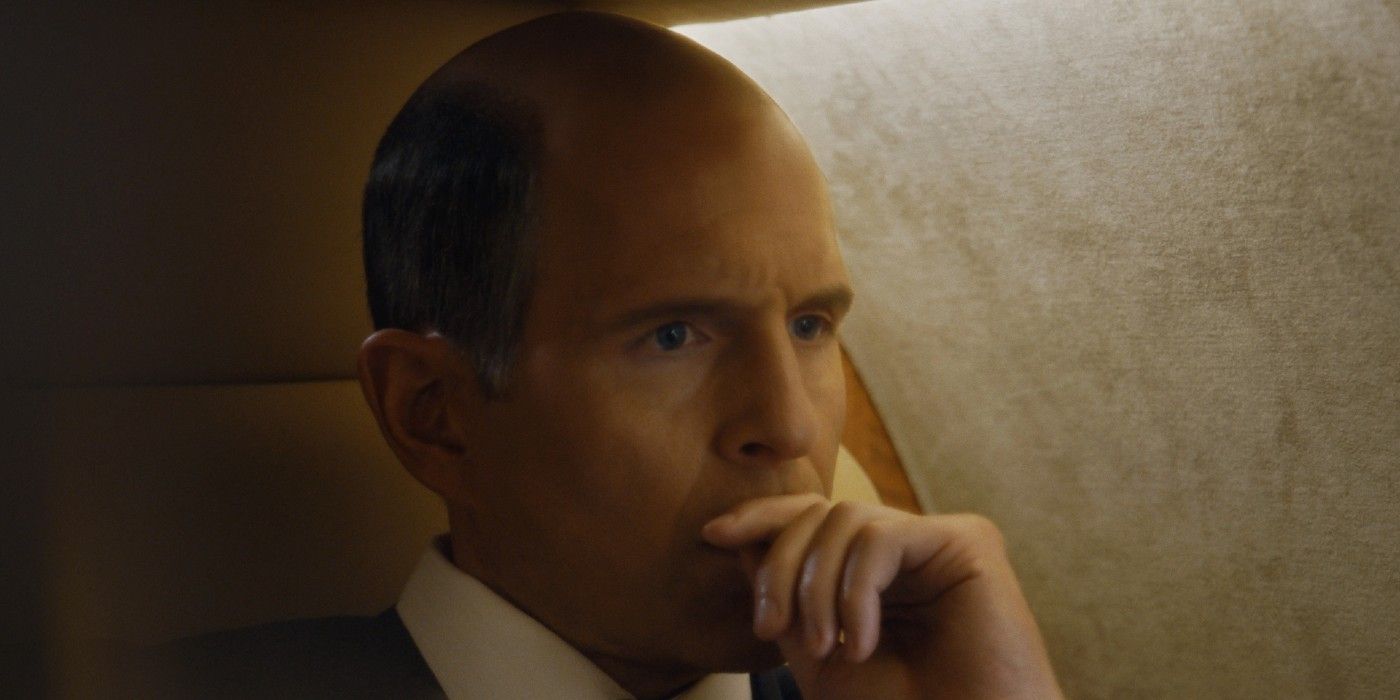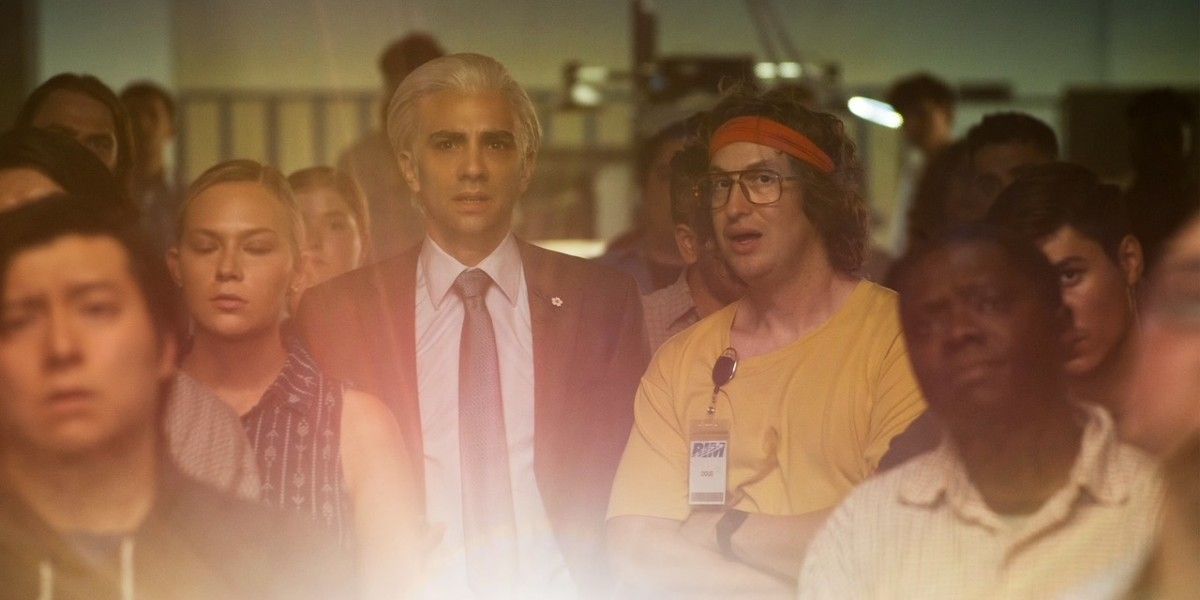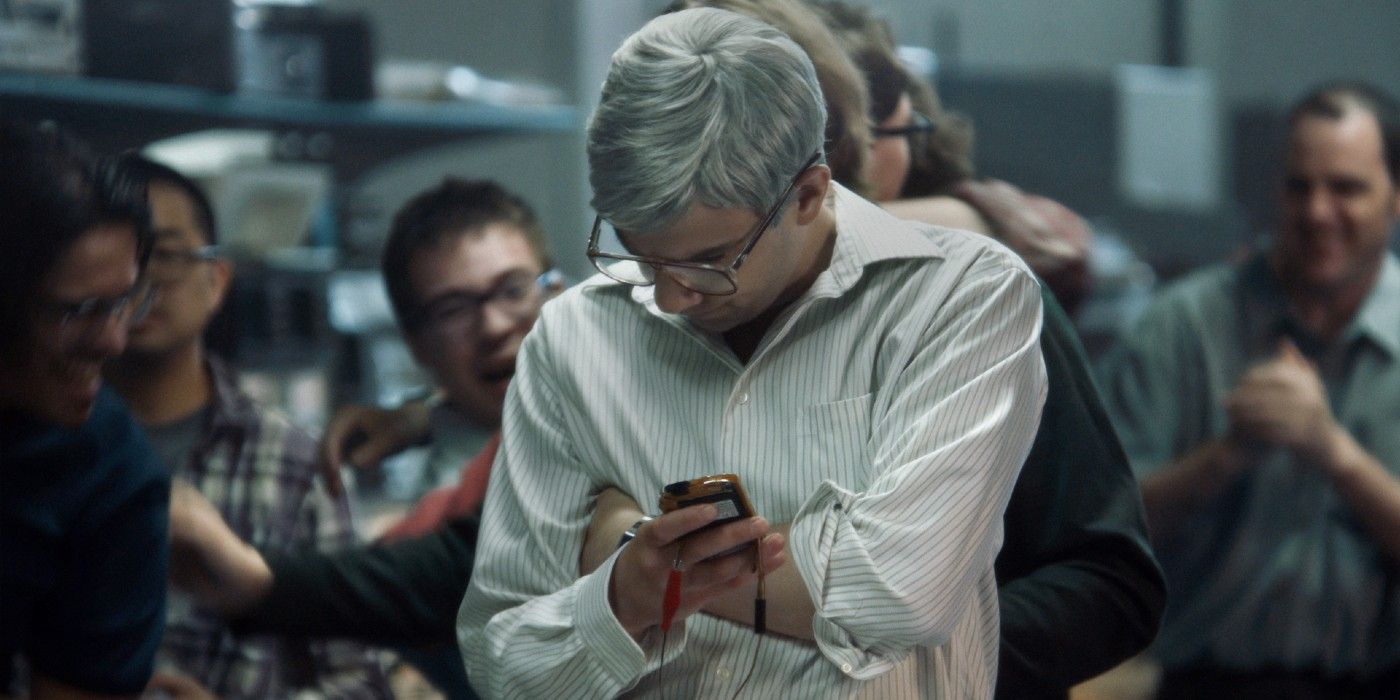BlackBerry opens with a disclaimer that describes the movie as a fictionalization inspired by real people and events, and it’s probably best to take director and co-writer Matt Johnson’s movie as satire rather than history. The broad strokes may be close to the true story of the rise and fall of the groundbreaking BlackBerry smartphone, but everything else is fabricated and exaggerated for comedic effect. Although it’s loosely based on Jacquie McNish and Sean Silcoff’s nonfiction book Losing the Signal: The Untold Story Behind the Extraordinary Rise and Spectacular Fall of BlackBerry, Johnson’s BlackBerry comes closer to Mike Judge’s Silicon Valley than a serious tech-industry biopic like The Social Network or Steve Jobs.
BlackBerry doesn’t need to be humorless to have something valuable to say about technology or business, but Johnson is so focused on creating comedic characters that he loses sight of the genuine personal interactions that define any start-up. Even the characters in Silicon Valley seem to have more humanity than Johnson’s version of businessman Jim Balsillie, played by Glenn Howerton as a slight variation on his sociopathic It’s Always Sunny in Philadelphia character Dennis Reynolds. Jim spends nearly the entire movie in a seething rage, yelling at his partners, his employees, his rivals, and anyone within earshot, and it’s exhausting to watch him for two hours.
Jim is the boardroom counterpart to expert computer engineer Mike Lazaridis (Jay Baruchel), who invents the device that would eventually become the BlackBerry with his best friend and Research in Motion co-founder Doug Fregin (Johnson). As the movie begins in 1996, Mike and Doug are unsuccessfully attempting to pitch their device, then known as the PocketLink, to Jim, a midlevel executive at a Canadian manufacturing company in Waterloo, Ontario. Mike and Doug are variations of nerd stereotypes, Mike with his big glasses and unfashionable haircut, Doug with his headband and Doom T-shirt. Those stereotypes barely deepen as the movie goes on, and there’s nothing like the complex examination of nerd insecurity and entitlement in The Social Network.
There isn’t much complexity to BlackBerry, but Mike and Doug are rich, multi-dimensional characters compared to Jim. Preoccupied with a pending merger meeting, Jim barely notices Mike and Doug while they’re pitching their idea. Later, when he’s fired for attempting to screw over a co-worker, he takes another look at the poster they’ve accidentally left behind. With the hubris that is essentially his only character trait, he insists that Mike and Doug sell him half their company and make him CEO, and in turn, he promises to make the PocketLink the next big thing.
Mike and Doug come off as ridiculously naïve in their dealings with Jim, who eventually agrees to take a smaller stake in Research in Motion and share CEO duties with Mike. Jim immediately terrorizes the employees of the small company, and he terrorizes the audience, too, with his abrasive, domineering presence that overshadows anyone else onscreen. Baruchel plays Mike as a meek pushover who’s much more comfortable tinkering with circuit boards than taking board meetings. Even as Mike grows more confident and successful, Baruchel’s performance struggles to catch up with Howerton’s.
Johnson divides the story into three time periods, jumping ahead to 2003 following Research in Motion’s first successful pitch to a telecom company. By that point, the small Canadian outfit is growing at an exponential rate as BlackBerry becomes a status symbol in the business world and steamrolls over every other early smartphone in the marketplace. BlackBerry balances out a bit after that, as actors including Cary Elwes, Michael Ironside, and Mad Men‘s Rich Sommer join the supporting cast, providing a bit of variety from Howerton’s bluster. Still, the movie remains focused on the contrast between Jim and Mike, who are uneasy allies at best, even during the company’s runaway success.
As anyone with even a cursory knowledge of modern technology is aware, BlackBerry’s enormous failure is just on the horizon, and the final section of the movie takes place in 2007 and 2008, as Apple introduces the iPhone and almost immediately destroys BlackBerry’s entire business. Johnson stacks the deck so obviously that even viewers who are somehow unaware of BlackBerry’s fate will see the company’s implosion coming from the very first scene between Jim and Mike, and there’s no tension or dramatic irony to how the story plays out.
Johnson shoots BlackBerry with a sense of documentary immediacy, and while there’s no breaking of the fourth wall, the dry comedic tone recalls other true-life dramedies that take a “can you believe this stuff really happened?” approach to their material, including Pain & Gain and I, Tonya. Nothing about the story of BlackBerry is quite as crazy as the real-life inspirations for those movies, though, and Johnson strains to bring comedic absurdity to a fairly mundane — if high-profile — story of tech-industry implosion. There’s nothing particularly incisive about the satire, and there are no insights about the people involved in such a spectacular failure. All BlackBerry manages to do is point and laugh.
BlackBerry opens Friday, May 12, in select theaters.







